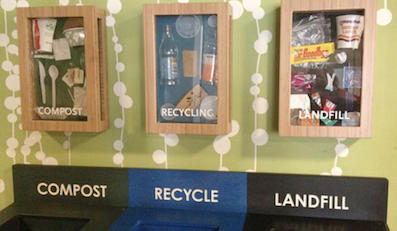 Cleanzine: your weekly cleaning and hygiene industry newsletter 18th April 2024 Issue no. 1110
Cleanzine: your weekly cleaning and hygiene industry newsletter 18th April 2024 Issue no. 1110
Your industry news - first
The original and best - for over 20 years!
We strongly recommend viewing Cleanzine full size in your web browser. Click our masthead above to visit our website version.
Green cleaning helps University of San Francisco achieve carbon neutrality ahead of goal
 The University of San Francisco has met its goal of zero net carbon emissions more than 30 years ahead of its 2050 target date set in 2014 with a series of large and small steps, including reducing campus water use by 30% and switching to green cleaning supplies, being strict with its recycling procedures and even installing micro turbines that produce heat and electricity right on campus and purchasing mission-driven carbon offsets.
The University of San Francisco has met its goal of zero net carbon emissions more than 30 years ahead of its 2050 target date set in 2014 with a series of large and small steps, including reducing campus water use by 30% and switching to green cleaning supplies, being strict with its recycling procedures and even installing micro turbines that produce heat and electricity right on campus and purchasing mission-driven carbon offsets.
"As Pope Francis wrote in his challenge to the world, Laudato Si: On Care for Our Common Home, every one of us has a responsibility to participate in swift and united action to repair humanity's relationship with the Earth," says USF President Paul J. Fitzgerald, S.J.
"For USF, this is both a matter of justice for the poor who even now suffer greatly from pollution and climate change, and a matter of justice for future generations who will suffer the consequences of the deleterious changes to our environment. The work USF has done as a community to reduce our carbon footprint aligns with the university's mission and values, as well as our hopeful vision for our common future."
Boilers, heating systems, windows, and lighting systems have been upgraded, and more than two-thirds of waste generated on campus is diverted from landfills through reuse, recycling, and composting. USF has also reduced campus water use by 30% since 2014, through water conservation initiatives, new pool filtration and kitchen equipment, and upgraded, high-efficiency water fixtures.
Another major component of achieving carbon neutrality is USF's purchase of carbon offsets, which financially support projects that reduce emissions. After calculating the total metric tons of carbon that USF produces each year, the University purchases enough offsets to account for carbon emissions that cannot be eliminated by its other actions. All of the carbon offsets that USF supports are mission-driven, with a focus on environmental justice. Examples include reforestation projects, capturing methane gas in garbage dumps, or replacing dirty stoves with clean ones in Africa.
USF's efforts toward carbon neutrality also align with the United Nations' Sustainable Development Goals focused on climate action and affordable and clean energy, as well as Pope Francis' call to protect Earth as our common home.
Richard Hsu, USF sustainability coordinator, says: "At USF, we're committed to our core values of creating, communicating, and applying knowledge to a world 'shared by all people and held in trust for future generation'."
An early champion of renewable energy, USF first installed solar thermal hot water systems in 1981, and added solar panels in the early 2000s - which now generate 5% of the main campus electricity. USF was also an early adopter of cogeneration technology, installing its system in 1987. This system produces 1.5 megawatts of electricity and the byproduct is heat that produces steam that is fed into USF's central heating system. This system produces approximately 40% of the University's main campus electrical and heating needs while saving significant money and reducing carbon emissions.
USF's achievement of carbon neutrality is impressive in light of the campus population, which has grown by 28% since 2005, says Charlie Cross, USF vice president for business and finance, who has overseen sustainability efforts over the past decade. USF encourages public transit for both students and employees, giving undergraduates MUNI passes and offering discounted passes to faculty and staff. Many campus vehicles are electric, and USF offers incentives to use bike-sharing programs to travel to campus. Today only 26% of USF students, faculty and staff commute alone to campus.
Susan Hopp, an adjunct faculty member who teaches courses in sustainability leadership and who helped create the USF sustainability plan, says of the initiative: "Sustainability is an important issue for the USF community of students, alumni, employees, faculty, and neighbours. People want to align their values with the organisations they are connected to.
"Expressing the values of USF through committed actions is really integral to a healthy university - and it also makes good business sense."
Before 2016, USF's main campus cafeteria, The Market Cafe, used recyclable single-use disposable to-go containers and cutlery, which still left a heavy carbon footprint. After switching to reusable plates, containers, and cups and stainless steel utensils, the University saw profound changes. During the 2016-2017 school year, The Market Cafe produced 25% less waste than the year before, and reduced its greenhouse gas emissions by 22%. It also cut costs by 53%. In addition, 20% of food on campus is largely sourced through local growers, and the University recently acquired organic Star Route Farms as part of its efforts to mitigate climate change and work toward fair ecosystems for all.
"Sustainability is not a destination," adds Susan. "We want to get to a point where we are going the other way, regenerating and creating our own energy. Carbon neutrality is a really key thing, and it embodies that USF is living its values."
25th April 2019







